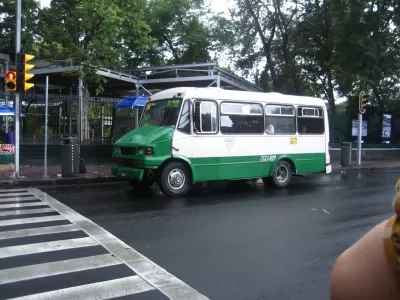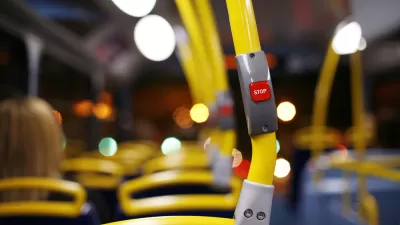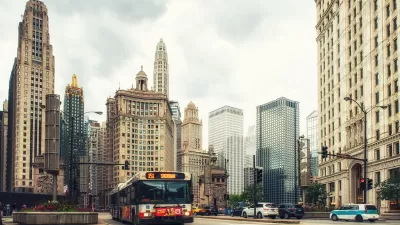Halfway between public transit and private cars, new and varying forms of 'microtransit' threaten to out-compete traditional public services. Concerns about equity, inclusion, and employee compensation follow.

In this piece, Jarrett Walker identifies a potential niche for microtransit, which includes services like UberPool, LyftLine, Bridj, and Leap, among others. What we should avoid, he argues, is a situation where private microtransit companies completely replace public transit.
Instead, "The way forward is for less expensive service tools, including the upstarts, to focus on lower-density suburbia where the land use patterns make efficient big-vehicle transit geometrically impossible. The upstarts could even become contractors of the transit agency part of the time -- paid to do things that they can do more efficiently than big buses can -- as taxis often are today."
If private and public transit cannot find equilibrium, we may face either a cutthroat mobility market or more of the same inefficient public services. "But when I hear the upstarts appealing to elitism, and derogating conventional high-efficiency transit, I wonder where we'll end up ... One thing is for sure: This sector is going to need strong regulation to turn it into a force for good."
Of course, private microtransit has long been a viable mode for city-dwellers in poorer countries. Lacking all start-up flashiness, a multitude of vans and small buses already fills the gaps left by public transit in places like Mexico City and Mumbai.
FULL STORY: Microtransit: good or bad for cities?

Planetizen Federal Action Tracker
A weekly monitor of how Trump’s orders and actions are impacting planners and planning in America.

Chicago’s Ghost Rails
Just beneath the surface of the modern city lie the remnants of its expansive early 20th-century streetcar system.

San Antonio and Austin are Fusing Into one Massive Megaregion
The region spanning the two central Texas cities is growing fast, posing challenges for local infrastructure and water supplies.

Since Zion's Shuttles Went Electric “The Smog is Gone”
Visitors to Zion National Park can enjoy the canyon via the nation’s first fully electric park shuttle system.

Trump Distributing DOT Safety Funds at 1/10 Rate of Biden
Funds for Safe Streets and other transportation safety and equity programs are being held up by administrative reviews and conflicts with the Trump administration’s priorities.

German Cities Subsidize Taxis for Women Amid Wave of Violence
Free or low-cost taxi rides can help women navigate cities more safely, but critics say the programs don't address the root causes of violence against women.
Urban Design for Planners 1: Software Tools
This six-course series explores essential urban design concepts using open source software and equips planners with the tools they need to participate fully in the urban design process.
Planning for Universal Design
Learn the tools for implementing Universal Design in planning regulations.
planning NEXT
Appalachian Highlands Housing Partners
Mpact (founded as Rail~Volution)
City of Camden Redevelopment Agency
City of Astoria
City of Portland
City of Laramie





























